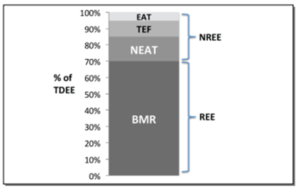Video Version
Audio Version
We’ve all been at that point in our fitness journeys where we are going through a dieting phase and we have hit a plateau.
This is a very common issue because your body is developing what are called “Metabolic Adaptations,” where metabolism starts to slow, hunger is up, satiety is down, hormones are off, etc. ¹
When you hit a true plateau, this just means you need to create a new way to spark fat loss again.
You can do this by:
- Dropping calories
- Doing more formal cardio
- Doing more non-formal cardio
- Combination of the three
In this article, we won’t get into detail with which form is best to break the true plateau. But, more so, we want to discuss 5 reasons you’re not dropping body fat outside of the true plateau and what to do it about it.
Let’s face it, its frustrating when you are putting in the work and not getting the results.
___
¹ Maclean et al. Biology’s response to dieting: the impetus for weight regain. 2011
After working with well over a thousand clients this past decade, we have seen these 5 reasons come up very frequently on an individual basis.
Without further ado, lets dive into this!
Reason 1- Lack of Non-Formal Cardio
When we say formal cardio, think of cardio modalities such as:
- Running
- Biking
- Swimming
- Playing sports
- Treadmills, step mills, ellipticals, etc
These are all ways of doing formal cardio to burn more calories and thus aid in fat loss.
Now, what a lot of people don’t really realize is that outside of formal cardio and resistance training, you still need to stay active.
Enter NEAT…Non-Exercise Activity Thermogenisis.
NEAT encompasses the expenditure of energy that is secondary to movement beyond purposeful exercise and resistance training activities.
Activities that promote NEAT include a series of continuous and vital movements with postural changes that do not involve moderate to vigorous intensity exercise and occur at a trivial or low energy workload on a daily basis for minutes to hours. ²
__
² Levine 1999; Kumahara 2004

Lets take a look at the above picture. In 2014 Trexler and collegues came up with a more accurate representation of what total daily energy expenditure (metabolism) should comprise of. ³
Notice how NEAT is substantially greater than EAT (Exercise Activity Thermogenisis). The point is that you cannot make hasty judgements about the need to add cardio without a diligent assessment of the individual’s profile of energy expenditure, which includes both exercise (resistance training and cardio) and non-exercise components.
When you really think about it, we resistance train for 1-2 hours a day and we really don’t burn that many calories from it. Throw in some cardio and you may get a little bit more calorie expenditure for the day/week.
__
³ Trexler et al. 2014
What to do About it-
It’s important to stay active outside of formal exercise (weight training and cardio) to expend more calories and thus lose more body fat if that’s your goal or just stay leaner overall throughout the year(s).
Here are some more NEAT things to do outside of formal exercise and cardio:
- Take the stairs instead of elevators
- Park further away from the office or stores
- Stand up more often if you sit a lot
- Take 5-10 min walks every couple of hours
- Wash the dishes instead of using the dishwasher
- Walk or bike to work instead of driving
- Do yard work
- Do stuff around the house
- Use a stand-up desk or walking treadmill desk while you work
- Take phone calls while walking around the office
- Wash your car by hand
- Reduce time spent at sedentary behaviors (watching TV, playing video games, on your phones on the couch)
- Practice your dance moves in front of the mirror 😉
Reason 2- Too Much Stress
Ahh that word “stress.”
We hear this word being thrown out a lot, so we want to give it some context.
There are endless potential stressors such as: 4
- Environmental stress (heat or cold)
- Physiological stress (intense exercise)
- Energetic stress (calorie restriction)
- Psychological stress (worrying about finances)
Each of these 4 forms of stress causes the body to respond in some form or fashion physiologically.
The reason stress gets a bad rep is because chronically high stress levels can lead to the production of the stress hormone “cortisol.”
Stress and cortisol play a major role in the overall control of bodyweight.5
Stress may increase or decrease hunger depending on a host of factors including the nature of the stress and the persons psychological profile.
The issue with stress and not losing body fat is when stress levels are chronically elevated because it causes the following issues:
- Water retention in the body and thus this masks weight loss
- Thyroid is reduced (lowering metabolic rate)
- Leptin and insulin resistance develops, and this may cause food intake to increase especially from high sugar/high fat comfort foods
__
4 The Woman’s Book. Lyle McDonald. V 1. 2018
5 Nieuwenhuizen AG and F Rutters.T he HPA axis in the regulation of energy balance. 2008
What to do About it-
As we mentioned above, short-small pulses in stress aren’t bad, they’re actually good (which we won’t get into in this article), but when stress levels are constantly high and chronic, that’s when issues with body weight and fat loss occur.
Here are some ways to minimize stress:
- Take more frequent work breaks
- Have a morning routine to get your “me” time in
- Have a wind down routine to shut down properly
- Get sufficient sleep and take more naps throughout the day
- Take deep breaths every hour to reset the system and relax
- Meditate or do yoga
Reason 3- Water Retention
To start this off, from a basic physiological stand point, our bodies are comprised of 70-75% of water.6
So, if you think about this logically, a lot of things can affect our bodies as far as water retention, having the scale fluctuate up and down, visually have our bodies holding onto water, and more.
Here are some factors that play a role in water retention:
- Chronically elevated levels of stress (see above)
- Insufficient sleep since our bodies deplete less moisture if you don’t get enough sleep and thus the scale can be up the next day from holding onto more water
- Excessive amounts of fluids and hydration
- Certain foods may hold more water content, more fiber, more sodium, and may sit in the gut longer and thus the scale will be up
- Climate can be a factor too due to more/less sweating and this can mess with scale fluctuations
- A very intense/rigorous training session can cause more soreness thus lead to more intracellular water retention
__
6 Understanding Nutrition. Whitney. 2013
What to do About it-
First thing to do about water retention is ask yourself a series of questions such as:
- Did you do anything different this past week?
- Are you stressed?
- Are you getting enough sleep?
- Did you drink more fluids than normal?
- Did you travel on a plane?
- Did you hit your macros or get a cheat meal?
- Did you consume more carbs than normal?
- Did you have high sodium meals?
- If you are a female, are you on your menstrual cycle?
All these factors play into water retention and weight fluctuations.
Reason 4- Increased Hunger
Hunger is such a complex topic, so we don’t want to go too in-depth and get too sciencey with this.
So, we are going to try and keep it simple stupid.
If we go back to what we discussed in the opening paragraph regarding metabolic adaptations occurring when we diet for too long or lose a large amount of body fat and muscle mass.
Some of the big metabolic adaptations that occur are: 7
- Increased hunger due to the hunger hormone Ghrelin being elevated and Leptin being decreased
- Decreased satiety signals
- Increased appetite and especially from high sugar/high fat comfort foods
When you have all of these adaptations occurring, hormones are out of whack from dieting, environmental stressors, life, and more going on, this is a recipe for blowing the diet by overeating and halting progress.
__
7Maclean et al. Biology’s response to dieting: the impetus for weight regain. 2011
What to do About it-
When dieting for a long time, losing body fat, and some muscle mass, its almost inevitable to not get hungry.
However, there are some ways to manipulate hunger:
- Incorporate a lot of the more satiating food sources from the above list to your diet
- Try having a full glass of water before, during, and after each of your meals
- Try having a large salad before some of your daily meals to feel more satiated
- Try chewing on gum or having coffee or tea in-between meals to curb your appetite
- First thing in the morning when you wake up, have a scoop of whey protein, Greek yogurt, or cottage cheese to hold you off for a couple of hours
- If you can get away with it, try having 3 larger and evenly balanced meals per day instead of 5-6 smaller meals
- If you feel you are going to binge due to being hungry and can’t tolerate it, have a high-quality protein snack such as beef jerky, egg whites, deli meat, scoop of whey protein, yogurt, or cottage cheese
Reason 5- Misreporting of Food Intake
Mis-reporting food intake is very common and there’s actually a good handful of data to support it.
Lichtman et al. Found that obese subjects with a reported history of “diet resistance” under reported food intake by an average of 47% and over reported physical activity by 51%.8
In a 2004 study out of the Journal of Human Nutrition and Dietetics, concluded “intentional under‐reporting and over‐reporting of food consumption are common in women of all BMI categories and are associated with eating behavior.”9
Its very easy to misreport food during a diet unintentionally and some of these ways happen from:
- Measuring foods with cups, tablespoons, and teaspoons instead of weighing on a scale and in grams
- Eyeballing foods instead of measuring accurately
- Mis-reported food labels
- “Diet friendly” foods (these tend to be higher in calories)
The reason why mis-reporting can prohibit you from dropping body fat is because say you are in a 400 calorie deficit and you start measuring your peanut butter on a tablespoon measurer instead of a scale, well its very easy to misreport this, so instead of actually eating say 200 calories for that serving of peanut butter, you may be eating 300 calories, now factor that extra 100 calories over 7 days and instead of a 400 calorie weekly deficit, you now have a 330 calorie deficit and thus your rate of fat loss is slower.
__
8Litchman et al. Discrepancy between self-reported and actual caloric intake and exercise in obese subjects. 1992
9Lara J.J. et al. Intentional mis‐reporting of food consumption and its relationship with body mass index and psychological scores in women. 2004
What to do About it-
Some effective ways to avoid misreporting your food intake are:
- Weigh your foods on a digital scale and in grams
- Eat predominantly whole and minimally refined foods
- Eat single ingredient food sources since they’re more accurate
- Refrain as much from packaged and processed foods since the nutrition facts are most likely inaccurate
Final Thoughts
We hope these 5 reasons you aren’t dropping body fat and what to do about it has really opened your eyes to why you’re not making the progress you want.
After working with well over a thousand clients this past decade, we have seen these 5 reasons come up very frequently on an individual basis and we have no doubt these practical applications we gave you will help you break through your fat loss plateau.
Just remember that during your fat loss journey, these things that happen are common, normal, yes frustrating, but there’s ways to avoid some of them and break through them.
If losing weight were easy, everyone would be lean, so just keep in mind to enjoy the processes during your fitness journey.
Interested In Us Helping You Transform Your Health, Body, And Life? Apply to our Online One-On-One Fitness Training Program HERE


